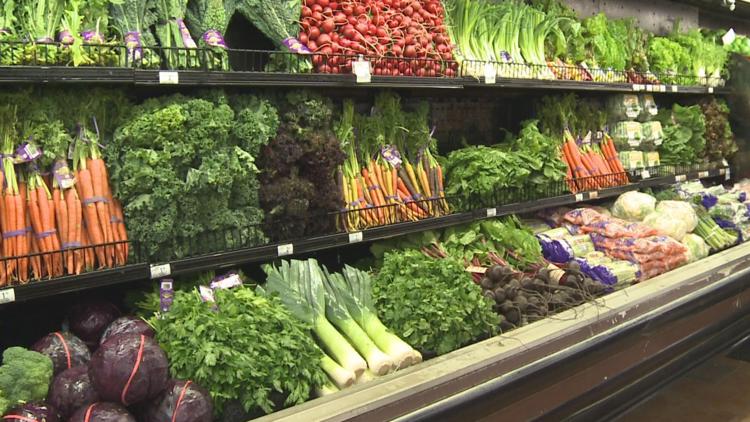Sacramento takes pride in being the 'Farm-to-Fork' Capitol.
Eating local isn't just a concept, it's engrained into the city's culture and lifestyle. Local products aren't just found at your neighborhood farmers market, they are boasted at bigger grocery chains, as well.
While browsing regional grocery stores, chances are you've come across products labeled as "local."
The demand for local food is growing in the country, both in direct-to-consumer, which is seen at farmers' markets, and in sales to stores and distributors, according to the U.S. Department of Agriculture (USDA) report.
But what exactly defines a local product at a grocery store?
There's actually no federal or state standard on how to define "local food" when it comes to the geographic distance between production and consumption, according to the USDA.
Grocery stores commonly base local products on marketing arrangements and have the freedom to create their own guidelines for local products.
ABC10 reached out to several grocery chains in the Sacramento area to learn more about the local foods at each company.
Here's what we found.
Safeway
Safeway operates over 250 stores throughout Northern California and is headquartered in Pleasanton, Calif.
Products grown and produced in California are considered local, according to Safeway spokesperson, Wendy Gutshall.
"We try to specify the actual city of origin at point of purchase whenever possible," Gutshall said in an email.
The items that are considered local are "clearly marked" for customers to identify, Gutshall explained.
Safeway can receive local products from various sources, including store employees but also, customer requests. Smaller farms can ask for a store director to consider their product, but decisions are made in the division office in Pleasanton, according to Gutshall.
"We realize many local items come from smaller companies so we have a dedicated team working specifically with local suppliers to help them get set up in our systems and able to supply to our stores," Gutshall said.
Safeway is in the middle of launching new in-store signs for local items which include vendor stories and tags.
Raley's
Raley’s owns and operates 123 stores: 74 Raley’s, 20 Bel Air Markets, 20 Nob Hill Foods supermarkets, eight Food Source stores and one Murieta Market by Raley’s, according the their website.
The stores are located across Northern California and Nevada, with headquarters in West Sacramento.
Raley's shoppers may be familiar with the 'Living Local' tag on product. The label means a product — usually produce — comes from a farm within 50 miles from the stores served. Products under the 'Living Local' tag must be from family-owned growers. Raley's features farmers from West Sacramento, Winters and Yolo County, according to their website.
Relationships with farmers vary from store to store, according to Raley's spokesperson, Chelsea Minor.
Some stores may receive products from smaller scale farmers, large farms, or both.
Other grocery staples such as crackers or dairy may come from further locations across Northern California, Minor said.
Save Mart
The Save Mart Company is headquartered in Modesto.
"Because we are located in California's Central Valley, we consider local to be within our operational foot print [sic] which covers Bakersfield to Northern Nevada," said Victoria Castro, spokesperson for the Save Mart Companies, in an email to ABC10. "We operate over 200 stores and source from farms and producers based in the Central Valley, Northern California, and the Central Coast."
Castro explained, the company buys year-round from Ratto Bros. in Modesto, as well as from Van Groningen and Sons and Perry and Sons in Manteca during the summer and fall. Save Mart also sources "as much corn as possible" out of Brentwood, according to Castro.
Save Mart also works with smaller farms, and on occasion, purchases local products that are sold at individual stores.
"When the season calls for it, we do buy Fresno State corn for four of our stores located in Fresno." Castro said. "During the asparagus season, we do purchase asparagus from the Stockton and Lodi markets and sell them in our Stockton and Lodi stores. We also purchase from Barsotti's, a juice company on Apple Hill, and have product delivered to one of our stores nearby Placerville."
Save Mart prefers to market the source of products rather than the term "local", according to Castro.
Sprouts
Sprouts operates nearly 300 stores across the U.S. and is headquartered in Phoenix. About a third of all Sprouts stores are located in California.
Sprouts defines "local" as made or produced in state a store is located at or within 500 miles of a store, according to the Sprouts website. The site states:
The ability to eat locally varies depending on a region’s production capacity. People living in areas that are agriculturally productive year-round may have an easier time sourcing food that is grown in their state than those in arid or colder regions.
Products range from store to store, according to a Sprouts spokesperson. They can range from peanut butter from a local mom and pop shop to a larger scale farm. Sprouts selects their products based on quality, flavor and price since it aims to appeal to the average grocery store shopper, the spokesperson told ABC10.
Trader Joe's
Trader Joe's operates across the U.S. with numerous locations in the Sacramento region.
"Local" isn't a particular term used on any of the company's private labels, according to Rachel Broderick, spokesperson for Trader Joe's.
Stores carry food and beverages from all around the world and often buy directly from suppliers.
"Many of our products do happen to be grown or produced in Northern California (certain produce items, baked goods, beers, eggs, milk, yogurts, etc.)," Broderick said in an email to ABC10.
Nugget Markets
ABC10 made several attempts to reach a Nugget representative and has not received a response.
The stores do use signage labeled, "local" to highlight local ingredients and products, according to the Nugget website.
Their website states:
"Products marked with our Local icon come from producers located within a 100-mile radius of our home offices in Woodland, CA"



